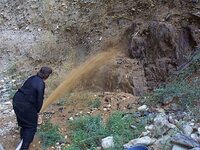Just curious if you guys wash your +3/4" rocks when working a bank. I found some gold clinging this weekend to rock i would normally toss. I set aside a half full bucket of water and filled it 3/4 the way with greater than 3/4" rocks. Shook the bucket quite aggressively to wash the rocks and panned what was in the bottom. Found quite a bit of fine colors at the bottom. Is there an easier way to do it without a trommel or grizzled high banker?
As of late I'm only using my finishing sluice in the field.
What are your methods or do you just chunk em?
As of late I'm only using my finishing sluice in the field.
What are your methods or do you just chunk em?











